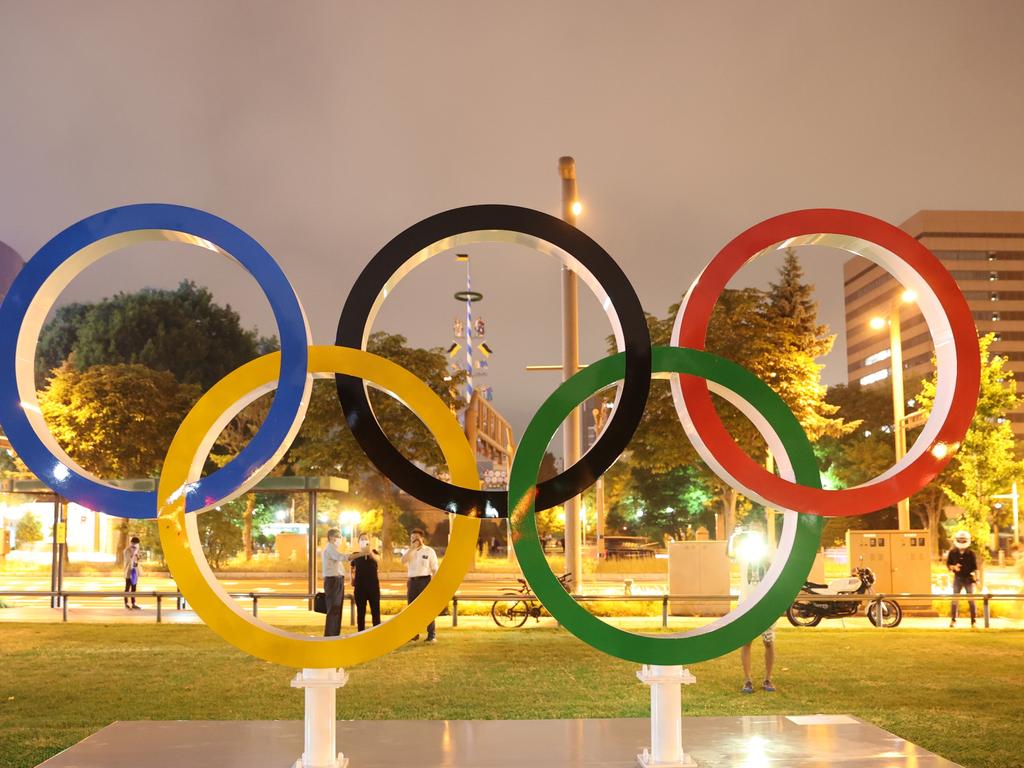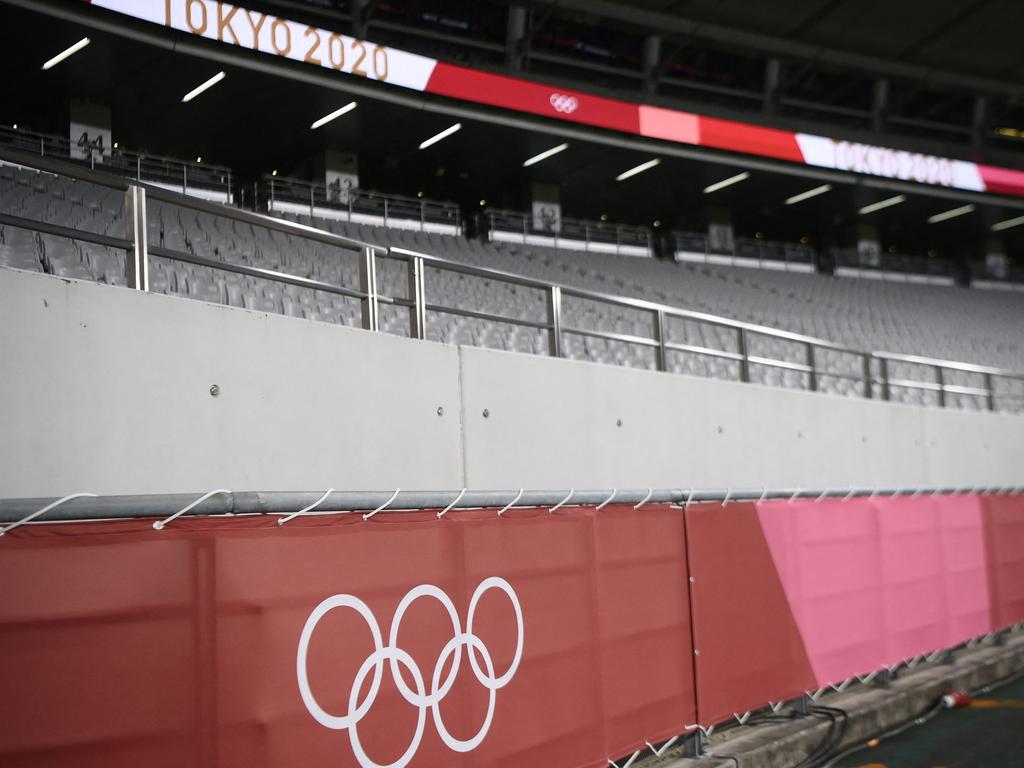Covid surge, public anger reveal Tokyo’s dirty little Olympics secret
Covid-19 cases have shot up on the eve of the Olympics, and you get the sense Japan is trying to hide something from its own citizens.
On an hour-long bus ride from Narita airport to central Tokyo, there was no indication the Olympics opening ceremony was just three days away.
Apartment blocks lined the roads but anyone looking for signs the biggest sporting event on the planet was about to take place would have come away empty-handed.
Swapping the bus for a taxi, it was more of the same. The 25 minutes or so from the cab rank in the city to a hotel down by the harbour produced precious little evidence the Games were afoot. It was only hundreds of metres from the hotel and giant media centre the first signs of life were spotted – small flags sitting atop lamp-posts and “Tokyo 2020” banners adorning huge carparks.
We’d been in Tokyo for 90 minutes and that was all there was spruiking the Olympics?
It begged the question: If the Games take place in a country but nobody’s around to see them, do they make a noise?
Covid cases surge as public resists
Public opposition to the Olympics going ahead despite the worrying Covid-19 situation in Japan had been widely publicised in the months and weeks leading up to D-Day. Some polls showed 80 per cent of respondents were against the Games as Japan grappled to get a handle on its health crisis.
More than 15,000 people have died from coronavirus in the country, which has registered upwards of 850,000 total cases.
Tokyo had been averaging around 1000 cases per day but that number shot up in the past week with the influx of athletes, media and officials from overseas. As of 4.45pm local time on Thursday, 1979 new positive cases were recorded, which contributed to a 155.7 per cent jump in the seven-day moving average compared to last week. It was the highest number in six months.
Japan’s capital is one of multiple prefectures under a state of emergency, which won’t be lifted until the end of the Games, meaning spectators are banned from attending events. We’ve already seen empty softball and football stadiums as the action kicked off this week, and the vibe outside the media centre is dead, with empty streets surrounding the waterside area.
If there was hesitancy before the Olympics about holding the event while covid continued to cause havoc, then the rise in cases and stream of stories about athletes testing positive will do nothing to ease concerns.

Companies turn their backs on Games
The mood was rammed home when Tokyo 2020 major sponsor Toyota decided it would not run TV ads during the Games or send any executives to be part of the 1000-strong VIP delegation for the opening ceremony.
Other companies are also pulling back in the biggest sign yet the Japanese public hasn’t come to grips with the government’s decision to plough ahead with the Olympics.
“The sponsors pulling out is a real indication that they’re concerned about, not whether people are going to buy their products in the long run, but that they’re being insensitive to the feelings of people and they don’t want to offend the people there in the Japanese population,” Associate Professor Brent McDonald, an expert in Japanese culture and sport at Victoria University, told news.com.au.
“Since the public opinion has been pushed against it and a lot of the major Japanese companies who are sponsoring the Games have been pulling their ads — they don’t want to be seen to be connected to the Olympics at this point. I think that suggests the reality of the Games, and maybe people’s understanding of it.”
Dr Jamie Cleland, an expert in sports sociology and sport’s role in shaping national identity at the University of South Australia, said sponsors were changing their tunes to adjust to public sentiment.
While Japanese citizens would have been thrilled at first to be hosting the Olympics, Dr Cleland said the current climate and covid situation over the past 18 months has forced a drastic rethink.
“They’re trying to understand their local market and they don’t want to upset their local market because the majority is against the Games taking place in the first place,” he told news.com.au.
“I can see why the Games are taking place from an economic sense … but with so many athletes testing positive then I can see why the public’s completely against it.”

Are the Olympics Japan’s dirty little secret?
All this adds up to the feeling Japan is hosting an Olympics, but doesn’t necessarily want its own people to know about it. Shouting from the rooftops about the Games will only draw more scrutiny to the health risks associated with them, and prompt more criticism and tough questions.
Politically and culturally, it’s dangerous for the Japanese government to be going ahead. But economically, it would have been catastrophic to cancel, leading to the loss of billions more dollars, particularly in broadcast revenue.
The government is fully aware of the public’s disenchantment with the Games, and Associate Professor McDonald said “that must be the case” when asked if the lack of outward-facing promotion is at least in part because politicians don’t want to rub the Olympics in their citizens’ faces, especially when they can’t even attend events in person.
So if organisers can line their pockets but avoid angering the public too much more, they’ll consider it a success.
Cultural contradiction is fascinating
There’s a tremendous sense of sadness that Japan will be robbed of showcasing its best self to the rest of the world – which is part of what the Olympics are all about for a host country - because foreign spectators were banned from coming.
Officials, workers and volunteers helping overseas journalists find their feet in Tokyo have been extremely polite, welcoming and friendly. If they were the only locals you interacted with, you’d assume there were no problems with the Olympics going ahead.
The notion of being as hospitable as possible, particularly to visitors, is known in Japanese as omotenashi. Even if locals were vehemently against the Olympics, they wouldn’t be inclined to show it.
Although predominantly a cultural trait, not being able to offer the hospitality it wants will also hurt Japan economically.
“The idea of hospitality, of omotenashi which is the Japanese word for this taking enormous care of visitors, there’s no opportunity to do that because no one’s coming, other than the athletes they can’t see,” Associate Professor McDonald said.
“In Japanese culture there’s this idea of outside and inside. You keep your inner feelings close and you don’t really put them out there because that upsets the harmony of the world. From a cultural perspective, you don’t express those sorts of things.
“The fact there’s been so much protest is really unusual but now there’s people involved there’s no way you would openly show anything other than hospitality and pride in your particular job.
“This idea of omotenashi, which is going above and beyond in terms of hospitality, putting the other person first and thinking about their experiences, is very much steeped in Japanese culture and tradition and learned from a young age.
“They were all supposed to benefit from this. People come for the Games and then travel. So the idea of not having that opportunity, it’s really, really sad.”



